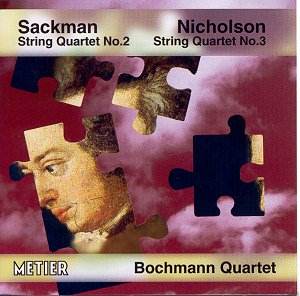Nicholas Sackman's Second String Quartet was written in 1990-1991 and first performed in 1991 at a Mozart: Preconstruction and Deconstruction concert at the Blackheath Concert Halls in London. The commission specified a "real and substantive connection with Mozart's music". Thus Sackman's piece alludes to some pieces by Mozart and particularly so in the final fugal movement based on Mozart's Afadio and Fugue K546. However Sackman manages to remain his own self throughout this substantial quartet and succeeds in thjis from first to last in spite of the Mozartiana. The first movement has a clear introductory character and is tenuously linked with a fragment of the Don Giovanni Overture whereas the second slow movement is discreetly based on an aria from the fourth act of Figaro. The Mozart material is much more evident in the busy fugal last movement which nevertheless ends somewhat unresolved. Again Sackman has been very successful in devising a fully integrated piece of music in which "Mozart's own music is simply swept into the maelstrom of personal creativity" while clearly avoiding any post-modernist collage. A quite substantial and highly rewarding piece and this superbly played and warmly recorded performance is a worthwhile addition to Sackman's shamefully scant discography.
His masterly orchestral work Hawthorn (1993) is available on NMC D 027 S whereas his delightfully colourful Cecilia dances (1994) is on a semi-commercial release from the Hertfordshire County Council and his Piano Sonata played by Steven Neugarten on another fine METIER CD (MSV CD 92008).
Not long ago I welcomed
another superb METIER release (Letters to the World: Music of
George Nicholson - MSV CD 92062) which offered a fine survey of
Nicholson's varied output. His Third String Quartet, written in 1995
and dedicated to the memory of the composer's grandmother, is another
example of his well-crafted, communicative music. Its single-span structure
falls into five short, contrasted sections. The opening section, mainly
on harmonics and tremolos, creates an expectant mood which bursts into
life in the next two sections; in fact two nervous Scherzos, which then
lead into the thoughtful, elegiac fourth section. This, the lyrical
centre of gravity of the work (pace the composer) is capped by
a final recapitulation of some of the earlier material. Again, Nicholson's
Third String Quartet is a very beautiful, moving piece, and I would
now very much like to hear his other quartets and more of his other
music.
The Bochmann Quartet have already demonstrated its empathy with British string quartet music and again they prove inspired and dedicated performers in these substantial additions to the British string quartet canon.
Hubert CULOT

![]() The Bochmann Quartet
The Bochmann Quartet
![]() METIER MSV CD 92016
[46:10]
METIER MSV CD 92016
[46:10]